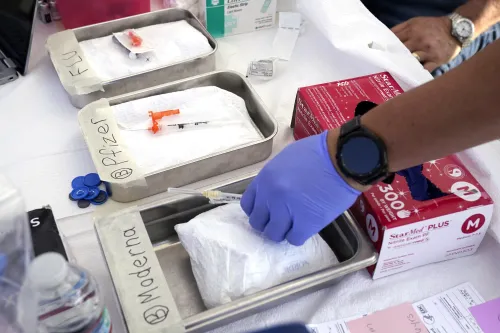The latest House Republicans overseeing pandemic probes are expanding their investigation into the origins of covid-19, after the Energy Department concluded with "low confidence" that the virus was most likely spread via an accidental laboratory leak in China, my colleague Dan Diamond reports. The House select subcommittee investigating the coronavirus response sent letters Monday to the Energy Department, State Department and FBI, seeking an array of materials and interagency communications on the origins of the pandemic and government-funded research. The subcommittee is scheduled to hold its first hearing on the origins question on Wednesday. The Energy Department, initially undecided about the virus's origins, changed its view about the likely cause of the pandemic following a new analysis by experts from the U.S. national laboratory complex — including members of a little-known scientific team known as Z-Division, which specializes in emerging security threats, The Washington Post's Joby Warrick, Ellen Nakashima and Shane Harris report. But within the administration, federal agencies remain divided over which theories they lean toward, with more favoring the natural transmission hypothesis. The Washington Post's Joel Achenbach was out with a deep dive this week into the two main theories about the origins of the pandemic, including what we know and what remains a mystery. U.S. officials have disclosed little new or compelling scientific information about the cause of the pandemic, despite the debate that came roaring back to life this week in light of the Energy Department's updated assessment, Joel notes. As it stands, there are two main theories about how the pandemic began. One is natural origin, a hypothesis favored among scientists, because pandemics have historically started with viral spillover. Essentially, this theory posits that the virus was transmitted from an animal to a human, probably at the Huanan Seafood Market in the Chinese city of Wuhan. The other is the "lab leak" theory, which asserts there was a laboratory accident at the nearby Wuhan Institute of Virology, which has done extensive work on coronaviruses. The origin of covid has become so polarizing that an explanation may never emerge that results in widespread satisfaction, Joel writes. Because the issue is politicized, it is vulnerable to motivated reasoning — interpreting facts to fit a preferred narrative. Read more from Joel's FAQ here. Other important news President Biden is calling on Congress to approve $1.6 billion to combat a "historic" level of fraud targeting the federal government's coronavirus aid programs, my colleague Tony Romm reports. The push could face familiar political obstacles on Capitol Hill, where lawmakers from both parties have ignored repeated requests for new money and greater resources to pursue pandemic wrongdoing. Gov. Gavin Newsom (D) officially ended California's covid-19 state of emergency this week, declaring that "the conditions of extreme peril to the safety of people and property … no longer exist." Such declarations continue in just six other states, including Texas and Illinois, according to the National Academy for State Health Policy, with Delaware's poised to end Friday. Pfizer and its German partner, BioNTech, are seeking emergency use authorization of their updated omicron-targeting coronavirus vaccine as a booster dose for children 6 months through 4 years of age, the companies announced this week. Coronavirus vaccine maker Novavax raised doubts about its ability to remain in business this week, citing serious financial challenges stemming from raw material shortages and manufacturing setbacks as it developed its shot during the pandemic, my colleague Christopher Rowland reports. | 







No comments:
Post a Comment